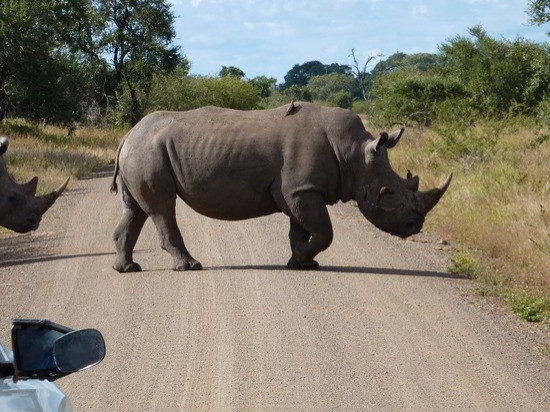Killing of Rhinos in South Africa Reaching Alarming Levels

The killing of rhinoceroses has reached epidemic levels in South Africa, which is home to about 90 percent of the global rhino population.
The World Wildlife Fund (WWF) has warned that almost 200 rhinos have been killed by poachers so far this year in South Africa, versus 333 for all of last year. The Fund has urged government wildlife officials to get tough on criminals who kill these rare creatures.
According to reports, there are more than 19,400 white and more than 1,600 endangered black rhinos in South Africa, most of which reside in the Kruger National Park.
The Kruger Park has a long border with the neighboring country of Mozambique, from where poachers come to sneak across the border to kill the animals prized for their tusks. Demand for rhino tusks is high in Asia – particularly China and Vietnam -- to where most of the tusks are smuggled.
Many of the poachers and smugglers are armed with sophisticated weaponry, including AK-47 assault rifles.
"They've become very aggressive," Ken Maggs, chief of the South African government environmental crime investigation unit, told reporters about the poachers.
"They leave notes for us written in the sand, warnings. That indicates it is an escalating issue. ... They are coming in prepared to fight."
Meanwhile, South African officials are apparently cracking down on poachers, having arrested more than 100 people this year. The government is also imposing longer prison terms and steeper fines to discourage poaching.
Joseph Okori, the WWF’s African rhino program coordinator, has said: “Poaching is being undertaken almost without exception by sophisticated criminals, sometimes hunting from helicopters and using automatic weapons. South Africa is fighting a war against organized crime that risks reversing the outstanding conservation gains it made over the past century.”
Okori also noted: “Swift prosecutions of wildlife crimes and strict sentences for perpetrators will serve as a deterrent to potential criminals. Poachers should be shown no leniency.”
However, the high value of the tusks makes poaching irresistible. The London Metropolitan Police said the substance is worth up to £60,000 a kilogram.
"Aside from Central and South America, every region of the world appears to be affected by criminals who are fraudulently acquiring rhinoceros horns," warned John M. Sellar, enforcement chief of the Convention on International Trade in Endangered Species, according to reports.
"Government officials are being corrupted. Money-laundering is taking place.”
© Copyright IBTimes 2024. All rights reserved.





















